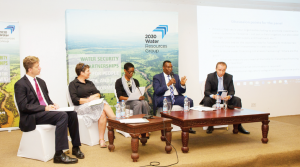Partnerships and innovative financing key to Tanzania’s water-smart future
NEWS SOURCE: The Guardian Tanzania
 Dar es Salaam, 22 November 2016 — The annual 2030 WRG Tanzania Partnership meeting, held last week, closed with calls for increased partnership and innovative financing to propel Tanzania’s water-smart future. Sponsored by the Ministry of Water and Irrigation and supported by the 2030 WRG Tanzania Partnership, the meeting convened over 100 stakeholders from the public sector, private sector and civil society to discuss ways to collectively strengthen water resource management throughout the country.
Dar es Salaam, 22 November 2016 — The annual 2030 WRG Tanzania Partnership meeting, held last week, closed with calls for increased partnership and innovative financing to propel Tanzania’s water-smart future. Sponsored by the Ministry of Water and Irrigation and supported by the 2030 WRG Tanzania Partnership, the meeting convened over 100 stakeholders from the public sector, private sector and civil society to discuss ways to collectively strengthen water resource management throughout the country.
Although Tanzania is not classified as a water stressed country, high rainfall variability regularly plunges some regions, central to the country’s economy, into severe seasonal drought. Increased demand on existing resources is further exacerbated by inefficient and rapid irrigation in addition to climate change.
The Ruaha River, for example, is drying up. More water than needed is abstracted, only 20 per cent of which is productive. Meanwhile, water sources in the Pangani Water Basin are already limited on per capita basis and future pressures are growing due to increased demand from commercial and urban water users.
In the face of these challenges, the government has been working to deliver a comprehensive water sector development strategy geared towards national objectives. Increased efficient workflows are helping utilities to better ensure sustainable water supply and sanitation, while more defined responsibilities within the Ministry of Water and waste water companies are driving enhancements. Newly established monitoring and advice mechanisms are further improving water quality and economically sound management practices.
Speaking about the country’s water resource management efforts, Eng Isack Kamwelwe, Deputy Minister for Water and Irrigation, praised 2030 WRG Tanzania partnerships related to the river basins of Pangani and Great Ruaha together with support for financing efficient irrigation for small-scale farmers. He stated: “Water is a crucial resource with great implications for socio-economic development. This partnership can play a major role in bringing positive results for water resource management.”
He especially commended the participation of private sector representatives in the partnership meeting and observed: “This shows how committed businesses are to join hands with the government, development partners and civil society to tackle water challenges facing the private sector and the nation at large.” Meeting participants discussed best practice and local success stories such as that of Serengeti Breweries and Olam’s Aviv Tanzania Coffee Plantation supported by partners such as Water Witness International and the Alliance for Water Stewardship.
Jane Joseph, an independent water resource management consultant, explained how civil society organisations are working with Serengeti Breweries to promote water stewardship standards through certification process supported by the partnership. She explained: “Serengeti Breweries have strong plans to reduce water usage in their processing systems. They have worked with Shahidiya Maji and Water Witness International to develop partnerships with other water users around their plants, especially in relation to groundwater challenges.”
The government is working with the public-private-civil society 2030 Water Resources Group Tanzania Partnership and the International Water Stewardship Programme to develop financing instruments for water-efficient smallholder agriculture in an effort to create funding for research, pilots and feasibility studies and promote international best practices from irrigation financing schemes.
Lucy Magembe, senior policy advisor at The Nature Conservancy civil society organisation, underlined the importance of having resources to tackle the water stress affecting both urban and rural areas: “We have to think about sustainable finance for water resource management. Smart finance mechanisms are key to funding initiatives for tackling water insecurity, supply challenges, growing demand and environmental degradation.”
Two new partnerships launched earlier this year—the Joint Great Ruaha Restoration Campaign and The Kilimanjaro Water Stewardship Platform—are further expected to contribute valuable solutions to the country’s water challenges in their respective regions.
The 2030 Water Resources Group is a global public-privatecivil society partnership with the goal to close the gap between water demand and supply by the year 2030.The 2030 WRG was invited in 2013 by the government of Tanzania to help strengthen water resource management through the development of a solution-oriented multistakeholder partnership. The Ministry of Water is driving the initiative along with senior members of the private sector and civil society. Global partners include bilateral agencies (such as Sida), private companies (including Nestlé, PepsiCo, Coca-Cola and SABMiller), development banks (such as the International Finance Corporation and the World Bank), international non-governmental organisations and income generation projects. The 2030 WRG was launched in 2008 at the World Economic Forum and has been hosted by IFC since 2012.
